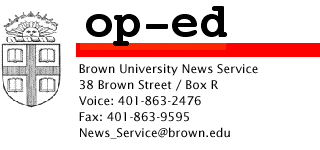Distributed January 22, 2003
Copyright ©2003 by William O. Beeman
Op-Ed Editor: Mark Nickel
About 900 Words
William O. Beeman
Who can stop the White House warriors? Only the American public
With public opinion so crucial in shaping the actions of the Bush administration, it seems certain that Americans will get a war in Iraq unless they say emphatically that they don’t want it. The militants in the White House are champing at the bit. Only their fear of the voters holds them in check.
The coming U. S. invasion of Iraq was not prompted by the events of September 11. It is a five-year-old plan, conceived by a cabal of officials currently running defense and security in the White House when they were out of power during the Clinton administration. The September 11 tragedy, along with the Bush presidency, gave them the momentum they needed to implement the plan, which lumbers forward like a drunken elephant threatening to destroy everything in its path.
It appears that the only force that can derail the war machine at this point is American public opinion. The administration will only back down if it fears it will lose the White House in 2004 by pursuing this conflict.
In 1997, during the Clinton administration, a number of refugees from the previous Bush administration, including Dick Cheney and his chief of staff I. Lewis Libby, got together to lobby then Speaker of the House Newt Gingrich to invade Iraq. This group was still smarting from the “unfinished” first Gulf conflict. Calling themselves the “Project for the New American Century” (PNAC), this group drew up the plans for a second Iraq war.
In a letter to President Clinton dated January 26, 1998, the PNAC called for “the removal of Saddam Hussein's regime from power,” and in a letter dated May 29, 1998, to Gingrich and Sen. Trent Lott, stating that Clinton had not listened to them, they asserted, “We should establish and maintain a strong U.S. military presence in the region and be prepared to use that force to protect our vital interests in the Gulf – and, if necessary, to help remove Saddam from power.” William Kristol, editor of the conservative Weekly Standard, was chair of PNAC.
Signatories to the plan constitute a neoconservative Who’s Who. Aside from Kristol, they include Elliott Abrams, the convicted Iran-Contra conspirator, whom Bush recently appointed director of Middle Eastern policy on the National Security Council; Paul Wolfowitz, deputy to Donald Rumsfeld at the Pentagon; John Bolton, now undersecretary of state for arms control and international security; Richard Perle, chairman of the Defense Science Board; William J. Bennett, secretary of education under President Reagan; Richard Armitage, deputy to Colin Powell at the State Department; Zalmay Khalilzad, President Bush's ambassador to Afghanistan; and other members of the current administration. Their ideas are no secret. They were printed in a September 2000 PNAC report entitled “Rebuilding America's Defenses: Strategy, Forces, and Resources for a New Century” and in a book, Present Dangers: Crisis and Opportunity in American Foreign and Defense Policy, edited by Robert Kagan and William Kristol.
These publications make it clear that the ultimate aim of PNAC for the Iraq invasion is permanent colonial occupation of Iraq and American domination of the region and its oil from that base of power.
Now all of these men are at the center of power in Washington. With so many chiefs beating the drums of war, it is not surprising that the White House slaps aside virtually every element that would modify or curtail the conflict – even facts. The lack of any proof of weapons of mass destruction in Iraq, the absence of any connection between Iraq and the al-Qaeda militants, the opposition of virtually every other nation on earth to a war in Iraq, the reluctance of the United Nations to support U.S. militancy, the astonishing decline in favorable world public opinion toward the United States, the poorly reported successful boycott of American goods by the 1 billion consumers in the Islamic world all seem to make no difference.
American public opinion seems to be the only force strong enough to stop the war machine, and the only one listening in the Bush administration appears to be White House political strategist Karl Rove. In engineering the political moves of this administration, Rove has been right most of the time, so the President pays attention to him. Rove’s strategy of advocating the war to American voters won the midterm congressional elections for the President. Now the winds have changed and Americans are no longer sure that invading Iraq with scant international support is a good idea. Given this lack of a public mandate for a unilateral war, Rove reportedly convinced the President to seek the approval of the United Nations and other Arab states in the region. However, it was clear that the war strategists went along expecting to garner quick nominal approval and then to proceed with the original invasion plan.
This did not happen. The invasion bogged down in debate and consultations. The delays created by U.N. deliberations and inspections brought out the petulance in Bush and Rumsfeld. The President is sounding like a 5-year-old having a tantrum these days, as he complains of the lack of progress in the inspections and berates Saddam. For his part, having called publicly for the Iraqi President’s ouster, Rumsfeld told reporters on January 16 that even if Saddam Hussein left Iraq, the United States still might invade. Apparently no one is going to deny these White House warriors their long-planned invasion.
This state of affairs is a stiff test for American democracy. With public opinion so crucial in shaping the actions of this administration, it is certain that Americans will get this war unless they say emphatically that they don’t want it. The militants in the White House are champing at the bit. Only their fear of the voters holds them in check.





